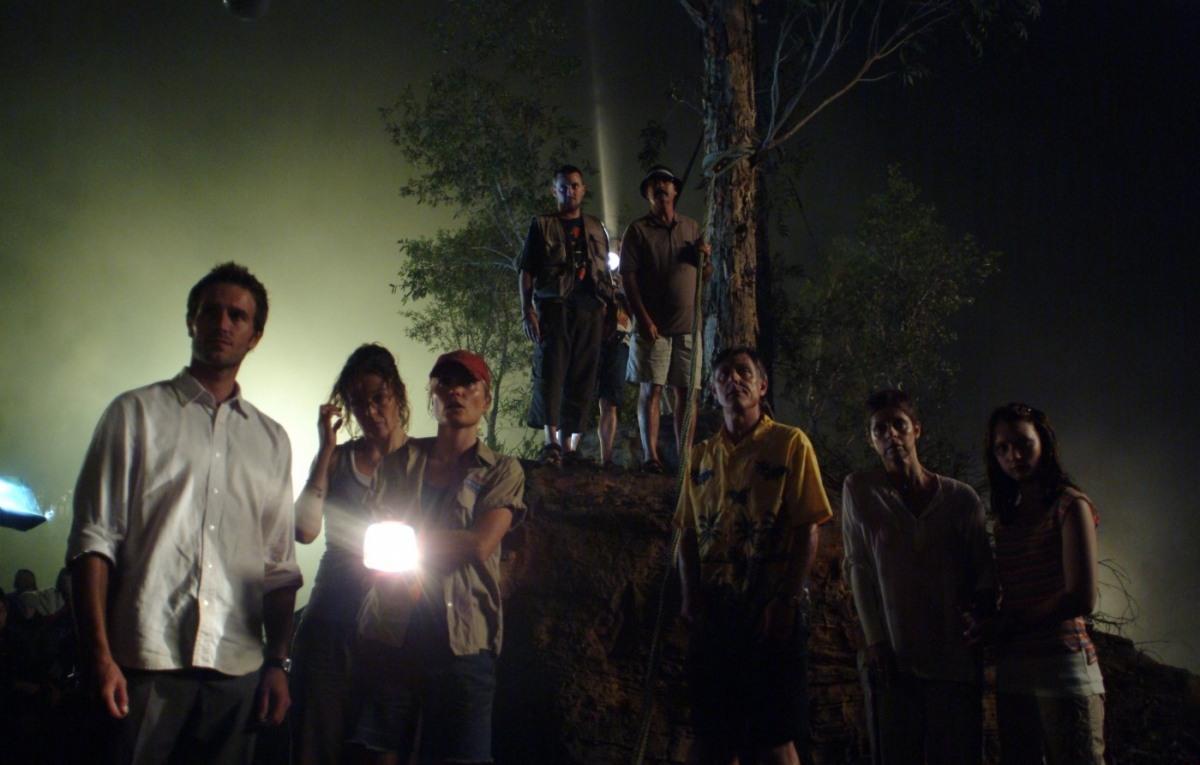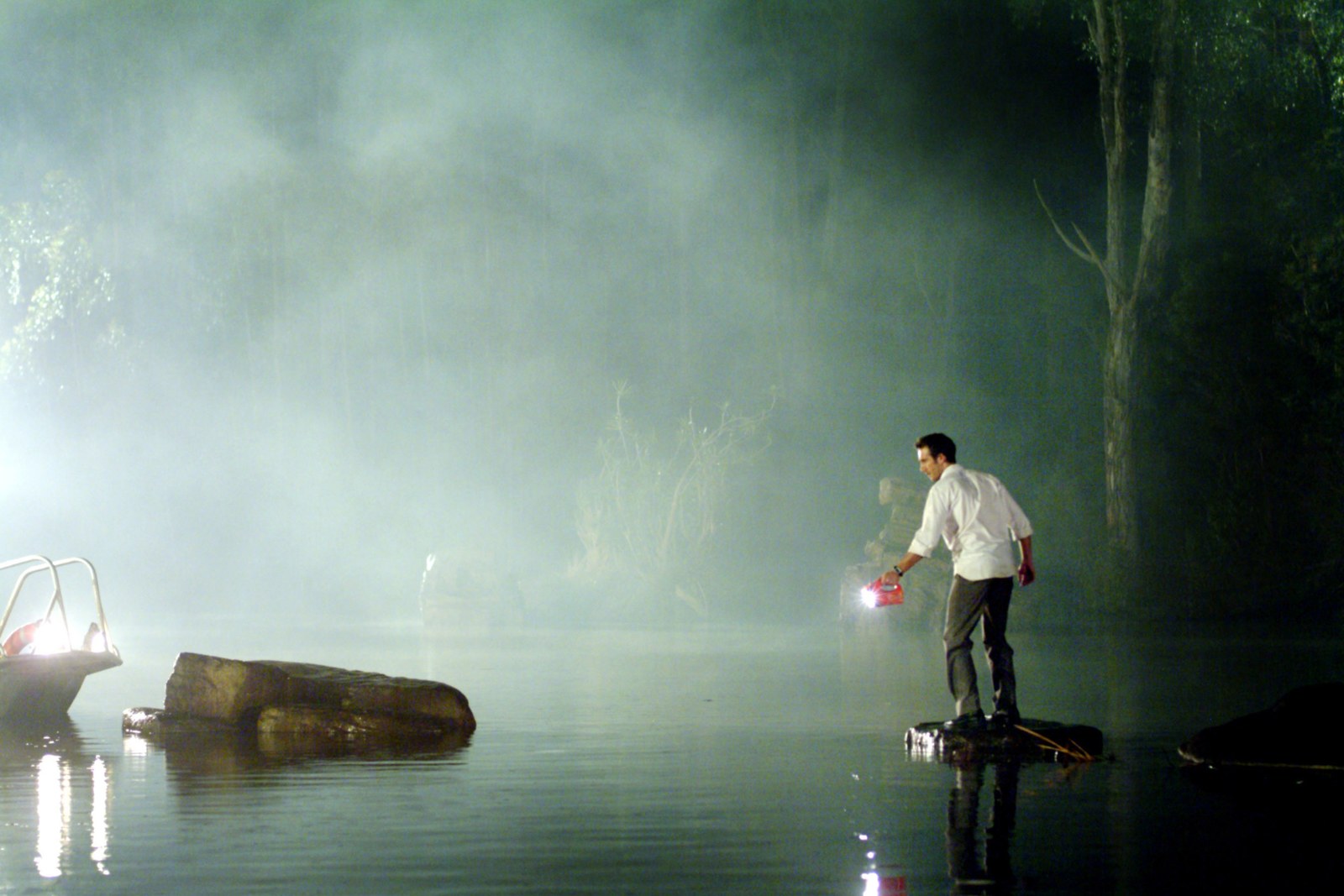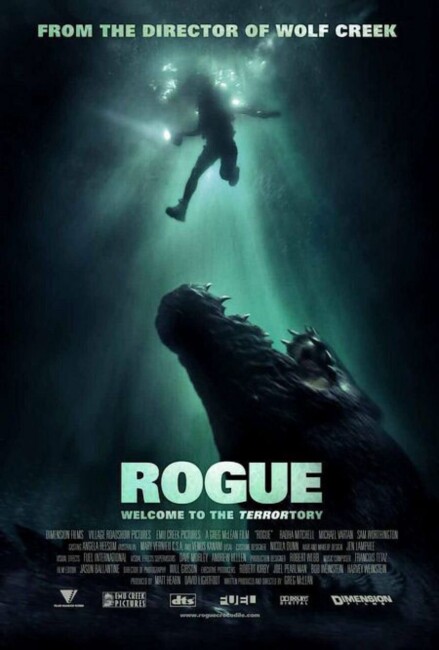Australia. 2007.
Crew
Director/Screenplay – Greg McLean, Producers – Matt Hearn, David Lightfoot & Greg McLean, Photography – Will Gibson, Music – Francois Tetaz, Visual Effects – Fuel International (Supervisors – Andrew Hellen & Dave Morley), Special Effects Supervisor – Mick Plummer, Animatronics – John Cox’s Creature Workshop (Supervisor – John Cox), Makeup Effects – Connelly Make-Up FX Team (Supervisors – Charmaine Connelly & Rick Connelly), Production Design – Robert Webb. Production Company – Emu Creek Pictures.
Cast
Michael Vartan (Pete McKell), Radha Mitchell (Kate Ryan), Sam Worthington (Neil Kelly), John Jarratt (Russell), Caroline Brazier (Mary Ellen), Heather Mitchell (Elizabeth), Stephen Curry (Simon), Celia Ireland (Gwen), Robert Taylor (Everett), Mia Wasikowska (Sherry), Barry Otto (Merv), Geoff Morrell (Allen), Damien Richardson (Collin)
Plot
American travel writer Pete McKell arrives in a remote part of Australia’s Northern Territories. He joins a tourist boat cruise run by Kate Ryan. While out on the river, they spot a rescue flare and so Kate delays their return to investigate, taking them into Aboriginal sacred land. The boat is then abruptly attacked and sunken by a giant-sized crocodile. The group are stranded on a mud flat where the crocodile starts picking off the passengers. At the same time, night is falling and the tide is rising, leaving the survivors with increasingly less room to seek safety.
Australian director Greg McLean had an enormous hit on the worldwide stage with the horror film Wolf Creek (2005), loosely based on the murder of backpacker Peter Falconio in 2001. Rogue was Greg McLean’s second film. Rogue is certainly made with a bigger budget and much more of an international eye than Wolf Creek – it features the moderately well-known Michael Vartan imported as the token American and is headlined by the internationally well-known Australian actress Radha Mitchell.
Like Wolf Creek, Greg McLean claims that he based Rogue (very loosely) on a true story – that of Sweetheart, a seventeen-foot crocodile that attacked boats (although was not known to have killed anybody) on the Finniss River in the Northern Territories in the late 1970s. Besides the quasi-true story aspect, Rogue and Wolf Creek have a number of other similarities – the focus characters in both (the backpackers in Wolf Creek, Michael Vartan’s travel writer here) are foreigners come to visit the wilds of Australia where they run afoul of the life-threatening dangers that lie in wait. In both cases, the films have scenes early on where the visitors’ city ways are cruelly made fun of by the locals. Both films also have moments that touch on a mystical view of the Australian Outback. Wolf Creek‘s disturbed killer John Jarratt also turns up in Rogue, almost unrecognisable as a bespectacled middle-aged passenger.
Greg McLean has no more profound an ambition in mind than crafting another variant on Jaws (1975). There had also been an earlier Australian killer crocodile film with Dark Age (1987), which notedly also featured John Jarratt as the lead. The same year as Rogue saw a host of other killer crocodile films with the A-budget Primeval (2007), another Australian effort with the highly underrated Black Water (2007), and cheap cash-ins like Croc (2007), Lake Placid 2 (2007) and Supercroc (2007). Of course, the other film that comes to mind is Russell Mulcahy’s Razorback (1984), which was one of the best Jaws copies, and likewise transferred the basics of an animal preying on people to the Australian outback and had a hero who was an American tourist. Both Razorback and Rogue have to stand as the two best films that attempt to rework the basics of Jaws.

Greg McLean has taken the essentials that Steven Spielberg laid down and conducted them exceptionally well. In the middle of the film, tension becomes drawn out to almost unbearable levels during Sam Worthington’s decision to swim across to the other side of the river in order to attach the rope, knowing the crocodile may be lurking anywhere; or the scenes with Caroline Brazier crossing the rope but freezing in mid-journey as John Jarratt endangers everything with his madcap rush to get across at the same time.
The film is at its most intensive during Michael Vartan’s venture down into the crocodile’s lair at the climax with some incredibly harrowing scenes as the crocodile pins him inside a narrow cranny, its jaws clashing down on Radha Mitchell’s body, and Vartan waiting with his makeshift spear as it finally comes to devour him, finally having to extricate himself from inside its mouth. The result is a genuinely intensive ride.
When it comes down to it, the plot is a very basic run through of the post-Jaws Animals Amok film, but the effect of Rogue all lies in Greg McLean’s ability to manipulate tension. The only points where McLean seems to falter is when it comes to killing off the sentimental favourites – the dog and the heroine – which he almost does at various points, only to pull back later and show that this is not the case. You get the impression of a filmmaker who decided at the last moment to be nice rather than push the film into something nasty and upsetting.

One of the finest aspects about Rogue is the cinematography. I am disappointed that I never had the opportunity to see Rogue on the cinema screen where it would have had even more power. McLean and cinematographer Will Gibson craft the scenes passing through the Northern Territories wilderness (territory they claim that no filmmaker had ever ventured into before) with exquisite beauty. The first twenty minutes of the film where the boat ride passes through the Outback landscape has a stunningly dreamlike quality to it. There is a brief point where the film crosses over into the quasi-mystical and we are allowed to glimpse an Aboriginal ritual going on as we pass a rock cave painted with giant crocodile symbols with McLean letting the suggestion subsequently linger that much of what happens is visited on the party because they have traversed into Aboriginal sacred lands.
Subsequently, Greg McLean went onto direct Wolf Creek 2 (2013), The Darkness (2016), The Belko Experiment (2016) and the non-genre survival film Jungle (2017), as well as to produce the lab experiment amok film Crawlspace (2012).
(Nominee for Best Director (Greg McLean) and Best Cinematography at this site’s Best of 2007 Awards).
Trailer here


